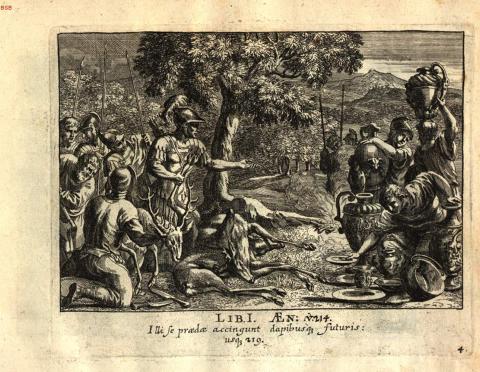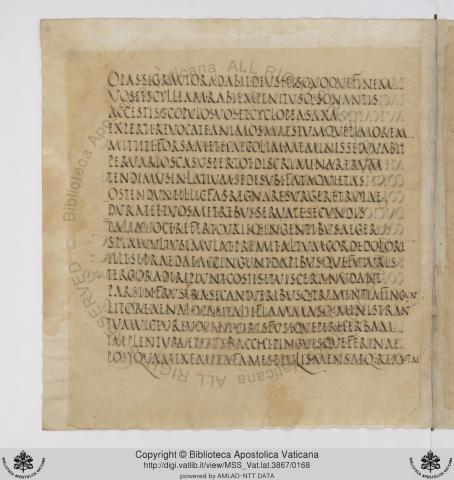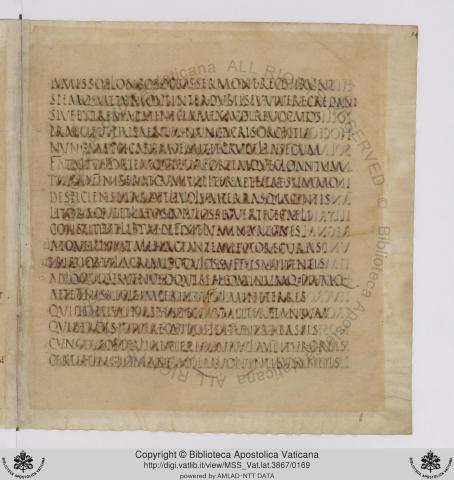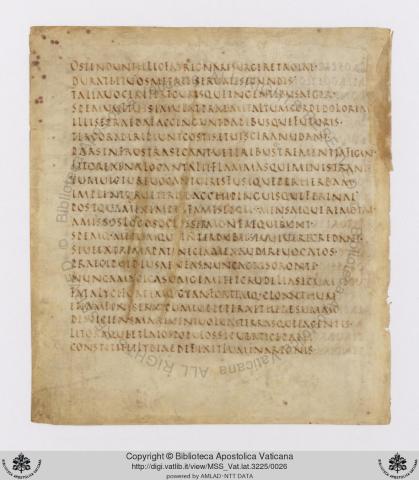CORE VOCABULARY
simulō, āvī, ātus, 1, a.: to make similar; imitate, 6.591; pretend, 2.17; to make a false show of, feign, 1.209; p., simulātus, a, um, made to imitate, counterfeiting, 4.512; dissembling, 4.105; imitating, resembling, 3.349. (similis)
accingō, cīnxī, cīnctus (pass. inf., accingier, 4.493), 3, a.: to gird on; gird, 2.614; arm, equip, 6.184; make one’s self ready; prepare, 1.210; resort to, 4.493. (ad and cingō)
daps, dapis, f.: a feast, banquet, 1.210; food, viands, 1.706; flesh of sacrificial victims, 6.225; usually found in the pl., but the gen. pl. is not used.
futūrus, a, um: about to be; future, 4.622. (sum)
tergum, ī, and tergus, oris (1.211; 9.764), n.: the back of men or animals, 1.296, et al.; the stern of a ship, 5.168; skin, hide, 1.211; gauntlet, hide, 5.403; form, frame, body, 2.231; carcass, body, 1.635; length, long body, 2.208; a layer, plate, 10.482; pl., terga, ōrum, members, frame, 6.422; gauntlets, 5.419; ā tergō, behind, 1.186; in tergum, to the rear, 11.653; vertere or dare terga, to run away, retreat, 6.491; 9.794.
dīripiō, ripuī, reptus, 3, a.: to tear apart or off; snatch, tear away, 3.227; plunder, pillage, sack, 2.563. See also dēripiō. (dis- and rapiō)
costa, ae, f.: a rib, 1.211; side.
vīscus, eris, n.: an inner part of the body; pl., vīscera, um, the entrails, vitals, 6.599; the flesh, 1.211; heart, bosom, 6.833.
nūdō, āvī, ātus, 1. a.: to make bare, naked; lay open, bare, 1.211; (fig.), expose, 5.586; lay open, disclose, 1.356. (nūdus)
frūstum, ī, n.: a piece, 1.212.
secō, secuī, sectus, 1, a.: to cut, freq.; cut off, 4.704; engrave, carve, 3.464; cut through, cleave, 5.218, et al.; of the channel of a river, 8.63; sail through, pass, 8.96; speed, 6.899; shape out mentally, form, 10.107.
verū, ūs, n.: a spit, 1.212; a slender, tapering lance; spit-dart, 7.665.
tremō, uī, 3, n. and a.: to tremble, quake, shake, quiver, 5.198; tremble at, fear, dread, 8.296.
fīgō, fīxī, fīxus, 3, a.: to fix or fasten; freq., the object in or on which, in the abl., 1.212; abl. w. prep., 6.636; acc. w. prep., 9.408; fasten up, suspend from, 3.287; hang up, 1.248; set up, establish, make, 6.622; transfix, pierce, 5.516; hurl (fix by hurling), 10.883; wound, 10.343; inscribe, 11.84.
aēnus, a, um: adj. (aes), of bronze; brazen, 2.470; subst., aēnum, ī, n., a bronze or brazen vessel; caldron, 1.213, et al.
locō, āvī, ātus, 1, a.: to place, put, 1.213, et al.; lay, 1.428; found, 1.247. (locus)
ministrō, āvī, ātus, 1, a.: to serve, attend to, manage, 6.302; to minister, give, furnish, supply, 1.150. (minister)
vīctus, ūs, m.: a living; nourishment, sustenance, food, 1.214. (vīvō)
herba, ae, f.: any grassy or herbaceous growth; grass, turf, 1.214, et al; fodder; herb, plant, 3.650; grassy land, pasture, meadow, 3.221; a plant.
Bacchus, ī, m.: Bacchus, the son of Jupiter and Semele, and god of wine, 1.734; wine, 1.215.
pinguis, e: (adj.), fat, 1.215; well-fed, 1.635; fertile; reeking, 4.62; fat or rich with victims, 9.585.
ferīnus, a, um: adj. (ferus), of wild beasts; of game; of animals, 11.571; subst., ferīna (sc. carō, flesh), ae, f., flesh, game, venison, 1.215.
eximō, ēmī, ēmptus, 3, a.: to take out; remove, 6.746; take away, remove, 1.216. (ex and emō)
epulae, ārum, f.: a banquet, feast, 1.79; food, 1.216. (sing. epulum)
removeō, mōvī, mōtus, 2, a.: to move away; remove, take away, 1.723.
requīrō, quīsīvī or quīsiī, quīsītus, 3, a.: to seek much or earnestly; seek out, search for, 3.170; demand; ask, question, 2.390; inquire, 2.506; speak with regret of, mourn, 1.217. (re- and quaerō)
sīve or seu: (conj.), or if, freq.; or, 5.69; elliptical, 11.327; sīve (seu) — sīve (seu), whether — or, 1.569, 570; either — or, 4.240, 241.
exterreō, uī, itus, 2, a.: to frighten; alarm, startle, terrify, 3.307; flutter in terror, 5.505; p., exterritus, a, um, startled; roused, 4.571.
nec or neque: (adv. and conj.), and not; neither, nor, 1.643, et al.; in prohibition, 3.394, et al.; neque (nec) — neque (nec), neither — nor, 5.21, et al.; nec — et, or -que, may be rendered neither — nor, 12.801; 2.534; nec nōn, and also, nor less, 6.183; nec nōn et, and also, 1.707.
exaudiō, īvī, or iī, ītus, 4, a.: to hear distinctly; hear, 1.219; catch the sound, hear from afar, 7.15; listen to, heed, 11.157.
praecipuē: (adv.), chiefly, especially, particularly, most of all, 1.220. (praecipuus)
Aenēās, ae, m.: 1. A Trojan chief, son of Venus and Anchises, and hero of the Aeneid, 1.92. 2. Aenēās Silvius, one of the Alban kings, 6.769.
Orontēs, is, ī, or ae: a leader of the Lycians and companion of Aeneas, 6.334.
Amycus, ī, m.: 1. Amycus, a son of Neptune, king of the Bebrycians, famous for his prowess in boxing, 5.373. 2. A companion of Aeneas, 1.221. 3. Another Trojan of the same name, 9.772.
gemō, uī, itus, 3, n. and a.: to groan, 7.501; sigh, 1.465; bemoan, bewail, lament, 1.221; of inanimate things, creak, 6.413.
crūdēlis, e: adj. (crūdus), unfeeling, ruthless, cruel, inhuman, 2.124; relentless, 1.547; unnatural, 6.24; mortal, deadly, 2.561; bloody, 1.355; bitter, 1.361.
Lycus, ī, m.: a companion of Aeneas, 1.222.
Gyās, ae, m.: 1. Gyas, commander of one of the ships of Aeneas, 1.222. 2. A Latin slain by Aeneas, 10.318.
Cloanthus, ī, m.: commander of one of the ships of Aeneas, 1.222.





